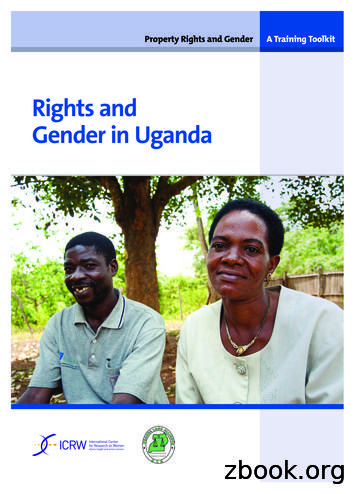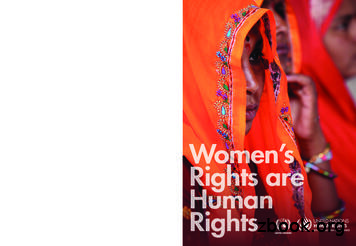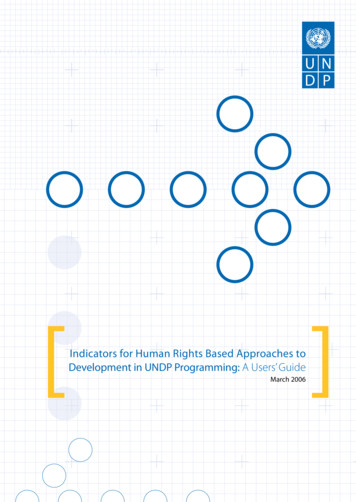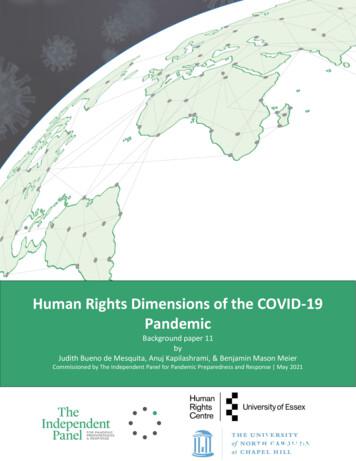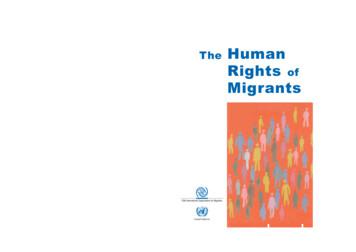Introduction To Human Rights Law - PNG
Introduction to Human Rights Law - PNGLegal Literacy Book 1.indd 1[]15/07/2016 12:14:04 PM
ForewordThis booklet, Introduction to Human Rights Law – Papua New Guinea,highlights some of the specific legislation the Papua New Guinean (PNG)Government had passed to address family and sexual violence and othergender related violence in PNG.Family and sexual violence is epidemic in PNG. Medecins Sans Frontiers(MSF) stated in their report, Return to Abuser (March 2016), ‘In PNG,women and children endure shockingly high levels of family and sexualviolence, with rates of abuse estimated to be some of the highest in theworld outside a conflict zone’.The Office of the Public Prosecutor estimated that during its last reporting period, 55% of all sexual violence cases dealt with the abuseof children under 16 years old. According to the Department of Health,two out of three women have experienced physical and sexual violence.We are also seeing a rise in the number of women, children and menbeing trafficked internally and into PNG. The PNG Government has alsoamended the Criminal Code in 2013 to give harsher penalties to thosewho are accused of inciting or causing sorcery related violence.This booklet provides a guide to the user(s), giving a brief snap shot ofthe basic human rights specified in the PNG Constitution and specificlegislation that relates to family and sexual violence. It helps the user(s)to understand that family and sexual violence is not a private matter buta criminal offence and that you cannot injure another person withoutfacing the full force of the law.We hope that this is also a tool that helps community advocates toeducate the community on their rights and laws that protect them andto bring change in their communities by sharing the information in thisbooklet. Remember, a life free from all forms of violence is your right.Ms. Ume WainettiNational Program CoordinatorFSVACLegal Literacy Book 1.indd 2Ms. Heather MacLeodCountry DirectorWorld Vision PNG15/07/2016 12:14:06 PM
AcknowledgementOn behalf of the Institute of National Affairs (INA), Consultative Implementationand Monitoring Council’s (CIMC) and World Vision Papua New Guinea (WVPNG),we would like to take this opportunity to acknowledge the following individualsand organisations that contributed to develop this booklet on Introduction toHuman Rights Law - Papua New Guinea.Working CommitteeMs. Ume Wainetti, National Program Coordinator– CIMC-FSVACMr. Isi Oru, Senior Program and Projects Officer – CIMC-FSVACMs. Rebecca Robinson, Technical Advisor – CIMC-FSVACMs. Enid Kantha, Programme Specialist – IOMMs. Kirsten Newton, FSV Advisor – Justice Services and Stability for Development (JSS4D)Mr. Tevita Seruilumi, Consultant – FijiReview CommitteeMr. Henry Yamo, Deputy Executive Officer – CIMCMs. Ume Wainetti, National Program Coordinator – CIMC-FSVACMs. Stella Rumbam, Zone 1 Operations Manager – WVPNGMr. Donald Kanini, Gender and Grants Officer – WVPNGMs. Leah Dama, Gender, Faith & Development Officer – WVPNGMs. Lorna Maso, Gender and Social Inclusion Coordinator – WVPNGMs. Ruth Koddy, Principal Legal Officer – DJAGMs. Louisiana Pep, Legal Officer - DJAGMr. David Kuvi, State Prosecutor – Office of the Public ProsecutorSpecial acknowledgement to the European Union for the support given in funding for the development of the booklet on Introduction to Human Rights Law– Papua New Guinea.Introduction to Human Rights Law - PNGLegal Literacy Book 1.indd 3[ 3 ]15/07/2016 12:14:06 PM
Table of ContentsIntroduction . 4Human Rights . 5Family Protection Act 2013:The new offence of Domestic Violence . 6Sexual Violence: Criminal Offence . 8Criminal Code Amendment 2013 on People Smugglingand Trafficking in Persons . 9Sorcery-Related Violence . 10Glossary . 12Introduction to Human Rights Law - PNGLegal Literacy Book 1.indd 4[ 4 ]15/07/2016 12:14:06 PM
IntroductionThe Family and Sexual Violence Action Committee (FSVAC) is a sectoral committee of the Consultative Implementation and Monitoring Council (CIMC). FSVACis mandated to look into the problems associated with family and sexual violence and to come up with concrete ways of addressing the problem in PapuaNew Guinea (PNG). CIMC-FSVAC is comprised of representatives from the government, private sector, non-government organizations, churches and development partners in which World Vision Papua New Guinea (WV PNG) is a member.CIMC-FSVAC in partnership with WVPNG is implementing the legal literacy project under the Papua New Guinea Leadership Against Gender-Based Violencefunded by European Union.WVPNG is a member of the WV International (WVI) partnership which implements relief and development projects in over 100 countries throughout theworld. In PNG, World Vision is registered as a local NGO under the name WorldVision (PNG) Trust.This booklet on Introduction to Human Rights Law - Papua New Guinea hasbeen designed for community advocates and educators working to reduce family and sexual violence and other gender related violence. We hope that it willhelp user(s) to understand key legislations and their applications related tofamily and sexual violence in PNG.Introduction to Human Rights Law - PNGLegal Literacy Book 1.indd 5[ 5 ]15/07/2016 12:14:06 PM
Human RightsHuman rights are inherent to all human beings, regardless of nationality, placeof residence, sex, sexual orientation, or ethnic origin, colour, race, political belief, economic status, religion, age, language, or any other status. We are allequally entitled to our human rights without discrimination (Universal Declaration on Human Rights).The Constitution of Papua New Guinea: Knowing Your BasicRightsThe PNG Constitution is the highest law in the country. Parliament must ensurethat all other laws are consistent with the Constitution. This means that otherlaws or customary practices cannot take away rights given by the Constitution.If a law goes against what is in the Constitution, Parliament needs to changethe law. The Constitution gives rights and freedoms to every PNG person. Theseare human rights.The Government of PNG is responsible for making sure that everyone’s rightsare protected – this makes the Government the duty bearer. All women, men,girls and boys in PNG are entitled to the rights and freedoms included in theConstitution – this makes you, rights holders. As a rights holder, you also needto make sure that you do not do anything that takes away another person’sbasic rights.The National Court now has a Human Rights Track and Human Rights Rules thatallow (amongst other things): A person to commence a human rights proceeding (e.g. complain about abreach of human rights) by filling out a Human Rights Enforcement Application form.The Court to commence proceedings on its own initiative (i.e. without aformal complaint being made).Any person to bring any suspected human rights breach to the attention ofthe Court.This means that it is not just a victim who can bring a case for enforcement. Itcan also be: a person or body who has an interest in the protection and enforcement ofhuman rights, ora person representing an international body with responsibility for protecting human rights, orIntroduction to Human Rights Law - PNGLegal Literacy Book 1.indd 6[6 ]15/07/2016 12:14:06 PM
any other person or body who has sufficient interest in the protection andenforcement of human rights as approved by the court.Basic Rights are:Right to freedomNo one can be forced to do anything that is not required by law. It includes freedom of speech and expression, movement, residence, and the right to practiceany profession or occupation.Right to lifeNo one can kill another person. The right to life can be limited if the NationalCourt finds someone guilty of serious crime such as aggravated rape or wilfulmurder and can order an execution.Freedom from inhumane treatmentNo one can be tortured.Important Any violence or torture against another person or a group of people by anindividual or group of people including members of their family or community is inhumane treatment.Liberty of the personA person has the right to move about freely unless he/she comes into conflictwith another person rights, example: trespassing on private property. A person’s movement can also be restricted when they have broken the law. Thenthe Government can arrest, detain and sentence that person for their crime.Freedom of employmentEveryone has the right to work. No one can be refused work based on theirrace, tribe, place of origin, political opinion, disability or sex.Important This does not mean that someone is entitled to any kind of work. Differentjobs will require different qualifications, skills and experience.Freedom from forced labourNo one can be forced to do work they have not consented to do and wherethere is an element of exploitation for example forced prostitution, child labour(example: a child babysitting a child). This right is limited for people who havebeen found guilty of a criminal offence and are imprisoned.Introduction to Human Rights Law - PNGLegal Literacy Book 1.indd 7[ 7 ]15/07/2016 12:14:06 PM
Freedom from search and entryNo one’s home or property can be searched unless:1. the law has given specific powers to a government department to entera house under situations where someone is at risk or it is believed that acrime has been committed.2. the Court makes an Order (search warrant) allowing for a house to besearched.Freedom of expressionEveryone can express their views and opinions freely by speech or publicationas long as it does not infringe on another person’s rights.Right to privacyEveryone has the right to a private family life and private communications withother people.Important This right can be limited if a crime has taken place within the home or if arecorded private communication is required in court as evidence.EqualityEveryone has the same rights and responsibilities regardless of clan, race, tribe,place of origin, political opinion, religion or sex.Important The Constitution allows for the creation of laws that benefit groups thatare discriminated, including women, children and young people, underprivileged and vulnerable groups.Family Protection Act 2013: The new offence ofDomestic ViolenceUnder the Family Protection Act 2013, domestic violence is an offence. DomesticViolence occurs when someone does one of the following to a family member: Assault (whether physical or otherwise)Psychological abuse, harassment or intimidationStalkingOffensive or indecent behaviorDamage to propertyIntroduction to Human Rights Law - PNGLegal Literacy Book 1.indd 8[ 8 ]15/07/2016 12:14:06 PM
A ‘family member’ is: A spouse A child or step child A parent or parent in law A grandparent A brother or sister or brother or sister in law Any other person who is treated as a family member.Penalty: A fine of up to K5000 and/or imprisonment for up to two years andcompensation.Note: The domestic violence offence is only intended to be used for lessserious matters. Other serious offences like: serious physical harm orcommitting sexual assaults or child sexual offences are dealt with under theCriminal Code, which has higher penalties, although the Family ProtectionAct may still be used to obtain Interim Protection Orders or ProtectionOrders in these cases.Protection Orders under the Family Protection ActUnder the Family Protection Act, an applicant may apply for two differenttypes of orders, which are civil orders (not criminal orders):a)b)An Interim Protection Order; orA Protection Order.Interim Protection Order (IPO)(a) Immediate protection for complainant and other family members againstdomestic violence(b) Contains conditions that restrain, restrict and prohibit the behavourof the defendant in order to prevent further violence(c) No lawyer required(d) Obtained at village court and/or district court(e) The court will assist with forms if required(f) 30 days duration with a 30 day extension if required(g) NO FEENote: An application for an IPO may be made without the knowledgeof the defendant if the court is satisfied that any delay would put theapplicant or a family member in danger of domestic violence or causeundue hardship. However, the order is only effective once it has been servedon the defendant.Introduction to Human Rights Law - PNGLegal Literacy Book 1.indd 9[ 9 ]15/07/2016 12:14:06 PM
Protection Order (PO)A PO differs from an IPO in the following key respects:(a)Only a District Court Magistrate can issue a PO; and(b)Up to 2 years in durationIPO or PO?An IPO will usually be issued where there is immediate danger of domesticviolence and the applicant needs protection while further evidence is gatheredor while the full case is waiting to be heard. The defendant need not be notifiedof the hearing. The Magistrate may convert the IPO into a PO when she or hemakes a final decision on the case.A PO is normally issued once the District Court Magistrate has made his or herfinal decision on a domestic violence case or application for a protection order.It will usually be made once the defendant has been notified and has had achance to have his or her side of the story heard.EnforcementAn IPO or a PO, as long as it has been validly served on the defendant, is enforceable in any part of Papua New Guinea by any District Court or police officer.Penalty: Breach of an IPO or a PO is a criminal offence for which thepenalty is a maximum fine of K10,000 and/or imprisonment for up tothree years.Sexual Violence: Criminal OffenceSexual violenceAny sexual act or attempt to obtain a sexual act by violence, coercion or deceit.This includes unwanted sexual comments or advances or acts directed againsta person’s sexuality, regardless of the relationship to the victim.The Criminal Code Act 1975, has criminalized any act of sexual violence as acriminal offence. The Code was amended in 2002. Under the amended CriminalCode (Sexual Offences and Crimes against Children Act 2002), it is a crime:(a) For a person who is in the position of trust or authority to have anyCONSENTING sexual relationship with a child aged below 16 yearsold.Introduction to Human Rights Law - PNGLegal Literacy Book 1.indd 10[ 10 ]15/07/2016 12:14:06 PM
(b) If the child is under the age of 12 years old, the penalty increases tolife imprisonment.Below are abstracts from the Criminal Code Act 1975, selected Provisions andthe Amended Criminal Code Act 2002 on Sexual Offence.RapeA person who sexually penetrates a person without his/her consent is guilty ofthe crime of rape.Marital RapeThis applies to non-consenting sexual activities involving men and women overthe age of 16 (inclusive of people who are married or in a sexual relationship).Under the Amended Criminal Code Act 2002, it is a crime without consent to:(a)(b)(c)(d)force sex on a man/womanput a penis into another person’s mouthput any body part (finger etc) into another person’s anus or vagina.force his/her wife or husband to have sex against his/her will.Penalty: depending on the nature of the abuse, the accused can bejailed up to 15 years or life imprisonment (pack rape, using of weapons,tools etc.)Sexual PenetrationThe act of penetrating (entering into/inserting) of a penis or a foreign objectwithout consent into another person’s vagina, anus or mouth. Even the slightestpenetration is considered complete penetration.Penalty: If the child (survivor) is under 12 years old, or the perpetratorhas abused the position of trust, he/she can be jailed for life.Note: Other than in the course of a procedure carried out in good faith formedical or hygienic purposes.Sexual AssaultA person who, without a person’s consent – touches, with any part of his/her body, the sexual parts of that other person; or compels another person totouch, with any part of his/her body, the sexual parts of the accused person’sown body, is guilty of a crime of sexual assault.Penalty: Subject to Subsection (4), imprisonment for a term not exceeding five years.Introduction to Human Rights Law - PNGLegal Literacy Book 1.indd 11[ 11 ]15/07/2016 12:14:06 PM
For the purpose of this section, ‘sexual parts’ include the genital area,groin, buttocks or breast of a person.Procured Sexual OffenceWhen you order or plan a sexual attack on another person for payment or payback you are committing a sexual offence (crime), even if you are personnalynot involved in the act.Penalty: Imprisonment for a term up to 20 years.Sex Crimes against ChildrenIt is a criminal offence to engage in any sexual activity with a child under theage of 16 years with or without consent.Sexual TouchingIt is crime to touch the sexual parts of a child (buttocks, anus, vagina or breast)or to force a child to touch the sexual parts of the perpetrator’s body.Penalty: The perpetrator will be charged and jailed up to 7 years. If thesurvivor is under 12 years old or the perpetrator has abused a position oftrust, he/she can be imprisoned up to 12 years.Indecent act directed at a ChildExposing of one’s private parts to a child in a sexual way or making childrenexpose themselves in a sexual way.Penalty: imprisonment for 5 years. 7 years imprisonment if the survivoris under the age of 12 or the position of trust has been abused.Persistent Sexual Abuse of a ChildCommitting any of the above sexual crimes against a child over a long periodof time.Penalty: the perpetrator imprisoned up to 15 years imprisonment.Note: It is not necessary to remember the dates or exact circumstancesof the sexual abuse.Introduction to Human Rights Law - PNGLegal Literacy Book 1.indd 12[ 12 ]15/07/2016 12:14:06 PM
Criminal Code Amendment 2013 on People Smugglingand Trafficking in PersonsHuman Trafficking involves:ACT: the recruitment, transportation, transferring, harbouring, or receiving ofpayments or benefits to have control over another person.By MEANS: threat, force, coercion, deception or the giving and receiving ofpayments or benefits to have control over another person.For the PURPOSE: of exploitation including prostitution, sexual exploitation,forced labour, domestic servitude, slavery and other similar practices.(Adapted from the United Nations Protocol to Prevent, Suppress and Punish Traffickingin Persons)How does Trafficking work?1. Transnational Trafficking- takes place between two or more countries.2. Domestic/Internal Trafficking- takes place within (i.e: rural-urban, village-village).Note: When identifying an Adult Victim of Trafficking, ALL three elementsmust be present. In the case of a Child/ren, only two elements need to bepresent; the ‘means’ is irrelevant.Penalties for Trafficking in Persons:In 2013, the PNG Criminal Code was amended through Criminal Code (Amendment) Act No 30 of 2013 to cater for the offence of human trafficking in linewith the international definition.(a) Adults: imprisonment for a term not exceeding 20 years.(b) Child/ minor: imprisonment not exceeding 25 years.(c) If the Victim of Trafficking (VoT) is subjected to circumstances thatcould result in death or results in death: life imprisonment.What is People Smuggling?People Smuggling is an organized illegal crossing over an international borderthat is provided in return for a certain payment or benefit by the migrant.Introduction to Human Rights Law - PNGLegal Literacy Book 1.indd 13[ 13 ]15/07/2016 12:14:06 PM
People Smuggling:(a) ALWAYS occurs over an international border.(b) Is a CRIME AGAINST the STATE.(c) Although in some cases is consensual, the act of smuggling can bedangerous and abusive.(d) Does not always but CAN lead to human trafficking.(e) Involves large profit
Human Rights Human rights are inherent to all human beings, regardless of nationality, place of residence, sex, sexual orientation, or ethnic origin, colour, race, political be-lief, economic status, religion, age, language, or any other status. We are all equally entitled to our human rights
Rights and gendeR in Uganda · 3 Rights & Human Rights Background Rights The law is based on the notion of rights. Community rights workers need to understand what rights are, where rights come from, and their own role in protecting and promoting rights. Community rights worker
A Human Rights Perspective by David Shiman Raising Children with Roots, Rights and Responsibilities: Celebrating the UN Convention on the Rights of the Child by Lori DuPont, Joanne Foley, and Annette Gagliardi Lesbian, Gay, Bisexual, and Transgender Rights: A Human Rights Perspective by David M. Donahue The Human Rights Education Handbook:
Human Rights Law at Indiana University School of Law-Indianapolis. He is widely published in International human international rights law, has lectured in many countries, and has extensive experience representing NGOs in United Nations and domestic human rights advocacy. Heli Askola, Ph.D. (2005) in Law, European University Institute, is Senior
make up the International Bill of Human Rights. The provisions of the two Covenants, as well as other human rights treaties, are legally binding on . of their human rights, for example marriage and the family. 6 WOMEN’S RiGHTS ARE HUMAN RiGHTS The Convention defines d
stream human rights into development projects and to monitor and implement a human rights-based approach (HRBA) to development more generally. From the side of human rights, the demand has come from recognition among the human rights treaty monitoring bodies, the Office of the High Commissioner for Human Rights, and a variety of Special .
human rights impact of COVID-19 and COVID-19 responses on human rights; the role of global health and human rights governance actors, including the WHO, World Health Assembly, Office of the High Commissioner for Human Rights and UN human rights oversight bodies, suggesting areas of action for
the concept of human rights, this essay will examine the tensions between human rights and state sovereignty, the challenges to the universality of human rights, the enumeration of rights recognized by the international community, and the means available to translate the high aspirations of human rights into practice. II.
consider the human rights dimension of contemporary migration. Under the Universal Declaration of Human Rights (created fifty years ago), human rights are universal (they apply everywhere), indivisible (political and civil rights cannot be separated from social and cultural rights); and inalienable (they cannot be denied to any human beings).

